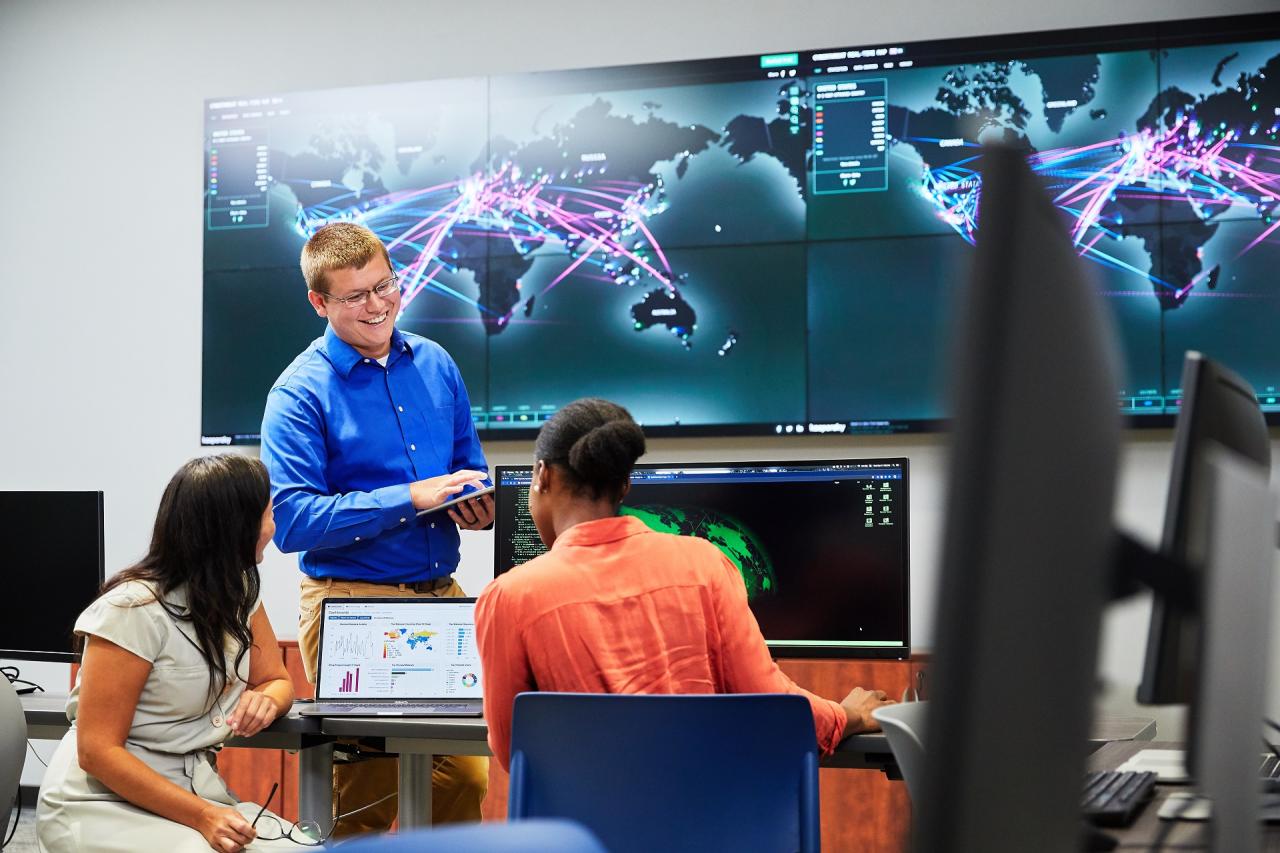
Bachelor’s degree computer science – A bachelor’s degree in computer science opens doors to a world of possibilities, shaping the future through technology. It’s not just about coding; it’s about understanding the fundamental principles that drive our digital world. From creating groundbreaking software to designing cutting-edge artificial intelligence, computer science empowers individuals to solve complex problems and drive innovation.
The curriculum of a computer science degree typically includes core courses in programming, data structures, algorithms, and software engineering. Students also delve into specialized areas like cybersecurity, artificial intelligence, or data science. These programs equip graduates with the skills and knowledge to excel in a rapidly evolving tech landscape.
Introduction to Computer Science
Computer science is the study of computation, automation, and information. It encompasses a wide range of topics, from the design and development of software applications to the theoretical foundations of computing. This field plays a crucial role in shaping our modern world, driving innovation across various industries and impacting our daily lives.
Fundamental Concepts
The foundation of computer science rests on several fundamental concepts:
- Algorithms: Algorithms are a set of well-defined instructions that specify a sequence of operations to be performed to achieve a particular goal. They are the core of problem-solving in computer science, providing a systematic approach to solving complex tasks. For instance, the algorithm for sorting a list of numbers involves comparing elements and rearranging them until they are in ascending order.
- Data Structures: Data structures are organized ways of storing and managing data. They enable efficient access, manipulation, and retrieval of information. Common data structures include arrays, linked lists, trees, and graphs, each with its unique characteristics and suitability for different applications. For example, a search engine uses a tree-based data structure to efficiently index and retrieve web pages.
- Programming Languages: Programming languages provide a means for humans to communicate with computers. They consist of syntax and semantics that define the rules for writing instructions. Different programming languages are designed for specific purposes, such as web development, data analysis, or artificial intelligence. Python, Java, C++, and JavaScript are examples of popular programming languages widely used in various domains.
- Computational Thinking: Computational thinking involves approaching problems systematically using the principles of computer science. It emphasizes breaking down problems into smaller steps, identifying patterns, and designing solutions that can be implemented by computers. This way of thinking is applicable not only to computer science but also to various other fields, fostering problem-solving skills and creativity.
Impact on Society
Computer science has revolutionized countless aspects of our lives, transforming industries and shaping the way we interact with the world. Here are some examples of its impact:
- Healthcare: Computer science plays a vital role in healthcare, enabling advancements in medical imaging, diagnosis, treatment planning, and drug discovery. Machine learning algorithms analyze patient data to identify patterns and predict health outcomes, while robotics assists surgeons in performing complex procedures with precision.
- Finance: The financial industry heavily relies on computer science for tasks such as stock trading, risk management, and fraud detection. Algorithms analyze market trends and predict financial performance, while secure systems protect sensitive financial data.
- Education: Computer science has revolutionized education by providing access to online learning platforms, interactive simulations, and personalized learning experiences. Educational technology tools enhance teaching methods and empower students to learn at their own pace.
- Entertainment: Computer science has transformed the entertainment industry, enabling the creation of immersive video games, realistic special effects in movies, and streaming services that deliver content on demand.
Real-World Applications
Computer science has numerous real-world applications, demonstrating its impact across various industries:
- Social Media: Social media platforms like Facebook, Twitter, and Instagram leverage algorithms to personalize content, recommend connections, and analyze user behavior. These platforms utilize machine learning and data mining techniques to provide users with tailored experiences.
- E-commerce: Online shopping websites use computer science to manage inventory, process orders, and recommend products based on user preferences. Secure payment systems protect financial transactions, while recommendation engines suggest relevant items based on browsing history.
- Autonomous Vehicles: Self-driving cars rely heavily on computer science, utilizing sensors, machine learning, and advanced algorithms to navigate roads, detect obstacles, and make driving decisions.
- Artificial Intelligence: AI systems, powered by computer science, are used in various applications, such as virtual assistants, image recognition, natural language processing, and medical diagnosis. These systems learn from data and improve their performance over time.
Bachelor’s Degree in Computer Science

A Bachelor’s Degree in Computer Science (CS) is a highly sought-after qualification that equips individuals with the knowledge and skills necessary to thrive in the ever-evolving world of technology. It is a comprehensive program that delves into the fundamental principles of computing, programming, and software development, providing a solid foundation for a successful career in the field.
Curriculum and Coursework
A typical computer science bachelor’s degree program comprises a diverse range of courses that cover both theoretical and practical aspects of the discipline. Core courses form the foundation of the curriculum, while elective options allow students to specialize in areas of interest.
- Core Courses: These courses provide a comprehensive understanding of fundamental concepts in computer science. They typically include:
- Programming Fundamentals: This course introduces students to programming languages such as Python, Java, or C++, focusing on basic syntax, data structures, algorithms, and problem-solving techniques. Students learn to write code, debug programs, and develop simple applications.
- Data Structures and Algorithms: This course explores the design and analysis of efficient data structures, such as arrays, linked lists, trees, and graphs. It also covers fundamental algorithms, such as sorting, searching, and graph traversal, which are essential for optimizing program performance and solving complex computational problems.
- Computer Architecture and Organization: This course delves into the internal workings of computers, including hardware components, instruction sets, memory organization, and data representation. Students gain a deep understanding of how computers process information and execute instructions.
- Operating Systems: This course examines the principles and concepts behind operating systems, such as process management, memory management, file systems, and security. Students learn about the role of operating systems in managing system resources and providing a platform for applications.
- Databases: This course introduces students to database systems, including relational databases, data modeling, SQL querying, and database design. Students learn how to store, manage, and retrieve data effectively.
- Discrete Mathematics: This course provides a foundation in mathematical concepts that are essential for computer science, such as logic, set theory, graph theory, and number theory. It helps students develop analytical and problem-solving skills that are applicable to various areas of computing.
- Elective Options: Elective courses allow students to delve deeper into specific areas of computer science that align with their interests and career goals. Some common elective options include:
- Artificial Intelligence (AI): This field explores the development of intelligent agents and systems that can perform tasks typically requiring human intelligence, such as machine learning, natural language processing, and computer vision.
- Software Engineering: This specialization focuses on the principles and practices of software development, including software design, testing, documentation, and project management. Students learn to build complex software systems that meet specific requirements and standards.
- Computer Graphics and Visualization: This area involves the creation and manipulation of visual content using computers. Students learn techniques for rendering images, creating animations, and developing interactive visualizations.
- Cybersecurity: This field focuses on protecting computer systems and networks from unauthorized access, use, disclosure, disruption, modification, or destruction. Students learn about security threats, vulnerabilities, and countermeasures.
- Networking: This specialization explores the principles and technologies behind computer networks, including network protocols, network security, and network administration. Students learn to design, configure, and manage networks.
Skills and Knowledge
A computer science degree provides a strong foundation in both technical and non-technical skills that are highly valued in the tech industry. Graduates develop a wide range of skills, including:
- Problem-solving and Analytical Skills: Computer science emphasizes logical thinking and problem-solving abilities. Students learn to break down complex problems into smaller, manageable components and develop efficient solutions.
- Programming Skills: Proficiency in programming languages is essential for computer science graduates. They gain hands-on experience in designing, writing, and debugging code, and learn to apply their knowledge to various applications.
- Data Analysis and Interpretation: With the increasing volume of data, computer science graduates are equipped with the skills to analyze, interpret, and draw insights from data. They learn to use data visualization techniques and statistical methods to extract meaningful information.
- Communication and Collaboration Skills: Computer science is not just about coding. Graduates develop strong communication skills to effectively convey technical concepts to both technical and non-technical audiences. They also learn to collaborate effectively with team members on complex projects.
- Adaptability and Lifelong Learning: The field of computer science is constantly evolving, so graduates need to be adaptable and committed to lifelong learning. They must stay up-to-date with emerging technologies and trends to remain competitive in the industry.
Career Paths and Job Opportunities
A computer science degree opens doors to a wide range of career paths and job opportunities in various industries. Graduates can find employment in:
- Software Development: This is a popular career path for computer science graduates. Software developers create, design, and maintain software applications for various platforms, including desktop, mobile, and web. They work on projects ranging from simple mobile apps to complex enterprise systems.
- Data Science and Analytics: With the explosion of data, data scientists and analysts are in high demand. They use their skills to analyze data, identify patterns, and generate insights that can help organizations make informed decisions.
- Web Development: Web developers are responsible for creating and maintaining websites and web applications. They work with various technologies, including HTML, CSS, JavaScript, and backend languages, to build interactive and user-friendly web experiences.
- Cybersecurity: As cyber threats become increasingly sophisticated, cybersecurity professionals are essential for protecting organizations from attacks. They work to identify vulnerabilities, implement security measures, and respond to security incidents.
- Artificial Intelligence (AI) and Machine Learning (ML): AI and ML are rapidly growing fields that offer exciting career opportunities for computer science graduates. They can work on developing AI algorithms, training machine learning models, and building AI-powered applications.
- Research and Academia: Computer science graduates can pursue careers in research and academia, conducting research, teaching, and contributing to the advancement of the field.
- Entrepreneurship: Many computer science graduates start their own businesses, leveraging their technical skills to develop innovative products and services.
Specialization Areas within Computer Science
Computer science is a vast and dynamic field with numerous specialization areas, each focusing on specific aspects of computing and technology. These specializations offer diverse career paths and cater to various interests and skill sets. Understanding these areas is crucial for students considering a computer science degree, as it helps them identify their passions and choose a path that aligns with their aspirations.
Software Engineering
Software engineering is a specialization that focuses on the design, development, and maintenance of software systems. Software engineers are responsible for translating user needs into functional and efficient software applications. This specialization involves a wide range of tasks, including:
- Requirement analysis and specification
- Software design and architecture
- Coding and implementation
- Testing and debugging
- Deployment and maintenance
Software engineering is a highly sought-after field, with numerous opportunities in various industries, including:
- Web development
- Mobile app development
- Game development
- Enterprise software
- Cloud computing
Software engineers need strong analytical and problem-solving skills, as well as proficiency in programming languages, software development methodologies, and software design principles.
Data Science
Data science is a multidisciplinary field that focuses on extracting knowledge and insights from large datasets. Data scientists utilize various tools and techniques to analyze, interpret, and visualize data, enabling businesses and organizations to make data-driven decisions. Key responsibilities of data scientists include:
- Data collection and cleaning
- Data analysis and modeling
- Data visualization and reporting
- Machine learning and predictive modeling
Data science has emerged as a critical field in various industries, including:
- Finance
- Healthcare
- Marketing
- E-commerce
- Research and development
Data scientists need strong analytical and statistical skills, proficiency in programming languages like Python and R, and a deep understanding of data mining, machine learning, and statistical modeling techniques.
Artificial Intelligence, Bachelor’s degree computer science
Artificial intelligence (AI) is a branch of computer science that focuses on developing intelligent systems capable of performing tasks that typically require human intelligence, such as learning, problem-solving, and decision-making. AI encompasses various subfields, including:
- Machine learning
- Deep learning
- Natural language processing
- Computer vision
- Robotics
AI is transforming various industries, including:
- Healthcare
- Finance
- Transportation
- Manufacturing
- Customer service
AI professionals need a strong foundation in mathematics, statistics, and computer science, as well as expertise in machine learning algorithms, deep learning architectures, and natural language processing techniques.
Cybersecurity
Cybersecurity is a specialization that focuses on protecting computer systems, networks, and data from unauthorized access, use, disclosure, disruption, modification, or destruction. Cybersecurity professionals play a crucial role in safeguarding sensitive information and ensuring the integrity and availability of critical systems. Key responsibilities include:
- Network security
- Data security
- Application security
- Incident response
- Vulnerability assessment
Cybersecurity is a rapidly growing field with high demand for skilled professionals across various industries, including:
- Finance
- Healthcare
- Government
- Education
- Retail
Cybersecurity professionals need strong technical skills, including network security, cryptography, ethical hacking, and incident response, as well as knowledge of security protocols, standards, and best practices.
Computer Graphics
Computer graphics is a specialization that focuses on the creation, manipulation, and display of images and visual content using computers. Computer graphics professionals work on various aspects of visual content, including:
- 3D modeling and animation
- Game development
- Visual effects
- Interactive design
- Scientific visualization
Computer graphics is a highly creative and technical field with applications in various industries, including:
- Entertainment
- Advertising
- Design
- Education
- Healthcare
Computer graphics professionals need strong artistic and technical skills, including proficiency in 3D modeling software, animation tools, and programming languages, as well as a deep understanding of lighting, shading, and rendering techniques.
Importance of Practical Experience

In the realm of computer science, theoretical knowledge is crucial, but practical experience is the key to unlocking true mastery and becoming a successful professional. This experience allows you to apply your theoretical understanding to real-world problems, hone your skills, and gain the confidence to excel in the competitive job market.
Internships
Internships provide a valuable opportunity to gain hands-on experience in a professional setting. They allow you to work on real-world projects, learn from experienced professionals, and network with potential employers. Internships can range from short-term summer programs to longer-term placements, providing a diverse range of experiences.
Projects
Personal projects are a fantastic way to explore your interests, experiment with new technologies, and build a portfolio showcasing your skills. Whether it’s developing a mobile app, creating a website, or working on a data analysis project, these projects allow you to apply your knowledge in a creative and self-directed manner.
Hackathons
Hackathons are intensive coding events where participants work in teams to build innovative solutions to real-world problems. These events foster collaboration, problem-solving, and rapid prototyping skills, providing a fast-paced and exciting learning experience. They also offer a platform to network with other developers and potential employers.
Future Trends in Computer Science

The field of computer science is constantly evolving, driven by groundbreaking innovations and emerging technologies. These advancements not only reshape the landscape of computer science but also profoundly influence various industries and aspects of our lives.
Quantum Computing
Quantum computing is a revolutionary approach to computation that harnesses the principles of quantum mechanics. Unlike classical computers that rely on bits representing either 0 or 1, quantum computers utilize qubits, which can exist in a superposition of both states simultaneously. This unique characteristic allows quantum computers to perform calculations exponentially faster than classical computers for certain types of problems.
Quantum computing holds immense potential across diverse fields, including:
- Drug discovery and materials science: Simulating molecular interactions to design new drugs and materials.
- Financial modeling: Optimizing investment strategies and managing risk.
- Cryptography: Breaking existing encryption algorithms and developing new, more secure ones.
- Artificial intelligence: Accelerating machine learning algorithms and improving AI performance.
While still in its early stages of development, quantum computing is poised to revolutionize numerous industries and create new opportunities for computer scientists.
Epilogue
A bachelor’s degree in computer science is a valuable investment in your future. It equips you with the skills to thrive in a tech-driven world, offering diverse career paths and the opportunity to contribute to groundbreaking advancements. Whether you’re passionate about creating software, developing artificial intelligence, or safeguarding data, a computer science degree can help you turn your passion into a rewarding career.
General Inquiries: Bachelor’s Degree Computer Science
What are the job prospects for computer science graduates?
Computer science graduates are highly sought after in a wide range of industries. They can find roles in software development, data analysis, cybersecurity, artificial intelligence, and more. The job market is strong, and there’s a growing demand for skilled computer science professionals.
Is a computer science degree difficult?
Computer science can be challenging, but it’s also incredibly rewarding. The curriculum requires dedication and problem-solving skills. However, with hard work and a genuine interest in the field, anyone can succeed.
What are the best computer science schools?
There are many excellent computer science programs worldwide. The best choice for you depends on your individual goals and preferences. Research different schools, consider their curriculum, faculty, and resources, and visit campuses if possible.
What are the different specializations within computer science?
Computer science offers various specialization areas, including software engineering, data science, artificial intelligence, cybersecurity, computer graphics, and more. Each specialization requires unique skills and knowledge, offering different career paths and opportunities.




